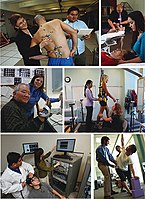
Photo from wikipedia
BACKGROUND Exposed-based psychotherapy is a mainstay of treatment for obsessive-compulsive disorder (OCD) and anxious psychopathology. The medial prefrontal cortex (mPFC) and the default mode network (DMN), which is anchored by… Click to show full abstract
BACKGROUND Exposed-based psychotherapy is a mainstay of treatment for obsessive-compulsive disorder (OCD) and anxious psychopathology. The medial prefrontal cortex (mPFC) and the default mode network (DMN), which is anchored by the mPFC, promote safety learning. Neuromodulation targeting the mPFC might augment therapeutic safety learning and enhance response to exposure-based therapies. METHODS To characterize the effects of mPFC neuromodulation on functional connectivity, 17 community volunteers completed resting-state functional magnetic resonance imaging scans before and after 20 min of frontopolar anodal multifocal transcranial direct current stimulation (tDCS). To examine the effects of tDCS on therapeutic safety learning, 24 patients with OCD completed a pilot randomized clinical trial; they were randomly assigned (double-blind, 50:50) to receive active or sham frontopolar tDCS before completing an in vivo exposure and response prevention (ERP) challenge. Changes in subjective emotional distress during the ERP challenge were used to index therapeutic safety learning. RESULTS In community volunteers, frontal pole functional connectivity with the middle and superior frontal gyri increased, while connectivity with the anterior insula and basal ganglia decreased (ps < .001, corrected) after tDCS; functional connectivity between DMN and salience network also decreased after tDCS (ps < .001, corrected). OCD patients who received active tDCS exhibited more rapid therapeutic safety learning (ps < .05) during the ERP challenge than patients who received sham tDCS. CONCLUSIONS Frontopolar tDCS may modulate mPFC and DMN functional connectivity and can accelerate therapeutic safety learning. Though limited by small samples, these findings motivate further exploration of the effects of frontopolar tDCS on neural and behavioral targets associated with exposure-based psychotherapies.
Journal Title: Depression and anxiety
Year Published: 2021
Link to full text (if available)
Share on Social Media: Sign Up to like & get
recommendations!